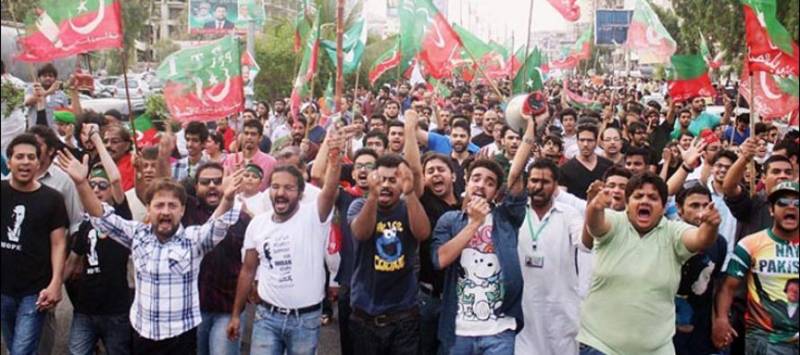For the past few days, TV screens were filled with scenes of crackdown on political workers from all across the country. Police raids, rowdy arrests, PTI’s criticisms and the government’s justifications overshadowed all other news. A variety of learned analysts sat on a number of TV channels for most of the day opining expertly as events unfolded every moment. Of course, a matter which had been escalated to this extent ought to be discussed at great lengths. But, an objective discussion about the core issue of the current crisis seemed comfortably lost to a sensationalist hullabaloo.
While debates over the legality of government’s high-handedness and PTI’s call to lockdown the capital soared, it seemed that a fundamental question regarding the whole issue had been conveniently side-lined. The question of the accountability of the powerful. If the bars of political correctness are ignored, this question can quite simply translated to, “what if the Prime Minister actually has his hands dirty?”. Whether PTI’s tactics in approaching this question were right or wrong is debatable but their right to raise that question was not.
Perhaps the most discerning feature between an authoritarian regime and a democracy is that in the latter, the people have a fundamental right and institutional procedures available to question their elected representatives. In our case, both seem to have been colossally compromised.
Panama leaks was an issue of no small gravity. The allegations on the Prime Minster and his family were not only seriously detrimental for the credibility of the political process but also discouraging for the taxpayers and potential foreign investors. A layman would most certainly ask that if the Prime Minster has ways of evading taxes, why should the common people willingly pay their taxes? Similarly, if the Prime Minister and his family prefer to keep their money out of the country, why would anyone else be encouraged to invest here?
These immensely loaded questions had the potential of compromising the regime’s moral authority and the fact that the opposition continued to blatantly repeat these questions, briefly in the Parliament and largely in public rallies, ensured that to a great extent.
The ideal way out of the impending crisis when Panama Leaks came out seven months ago was of course that the Prime Minister himself had volunteered to be investigated. But, the political culture that we have had in this country of course makes such an idea naive wandering in an improbable utopia. Hence, instead the government and its diligent spokesmen took it upon themselves to defy any appropriate route to probing the financials of the Prime Minister and his family.
But even more alarmingly, none of the state institutions managed to play their due part in ensuring the allegations raised in Panama Leaks were duly investigated. National Accountability Bureau, the premier institution in-charge of investigating charges of corruption, remained thoroughly inactive, hinting at the lack of institutional freedom in place in our democratic structure. The responsible institutions remained so inactive that the Supreme Court had to intervene once again to calm an impending storm.
The last time Nawaz Sharif was on the roads against a government was in the Movement for Restoration of Judiciary. That movement had a bigger purpose than merely restoring a few old men into their public offices. That movement was about preserving the idea of the “rule of law”- a slogan of which PML-N was a frontline flag-bearer of itself. The very idea of rule of law, in turn, means institutional freedom to ensure that no one is treated as being above the law. However, the tactics adopted by the PML-N government, to openly defy the accountability of the Prime Minister and his family, stand in stark irony to the idea of rule of law.
Instead of getting away with the opposition’s cries by allowing the institutional road to an independent investigation, the government tried to scandalize the idea of questioning the Prime Minister. Counter-allegations were hurled on the PTI chief, including alleged charges of corruption in Shaukat Khanum hospital. The Prime Minister has been hastily holding public rallies, sounding not like an elected Prime Minister but a mere political leader eyeing for political support in a pre-election scenario.
The government fails to realise that defying an independent pathway to accountability has thoroughly compromised it moral legitimacy.
The protestors gathered in Bani Gala or those stopped at the capital’s entry-points have become a political reality too big to be tear-gassed out of the popular public memory. The opposition forces have got more air-time than they have in the past seven months. Panama Leaks has become an issue greater than it has ever been. While judicial intervention might have cooled down the political atmosphere for the time being, it has come at the cost of increasing public distrust on the government.
Cooperating with the judicial process is now the only way left for government to ensure some sort of damage-control. Because, in the absence of any independent institutional way of ensuring the allegations are put to rest, the regime will continue to lose its moral authority every day. And, in the face of losing moral authority, it will have to resort to physical authority again if the protests were to surge in future. Recent scenes from within and around Islamabad did not look too encouraging for democracy. The government needs a thorough revision of what its approach has so far been on the Panama Leaks, if for nothing else, to at least regain its moral legitimacy.






